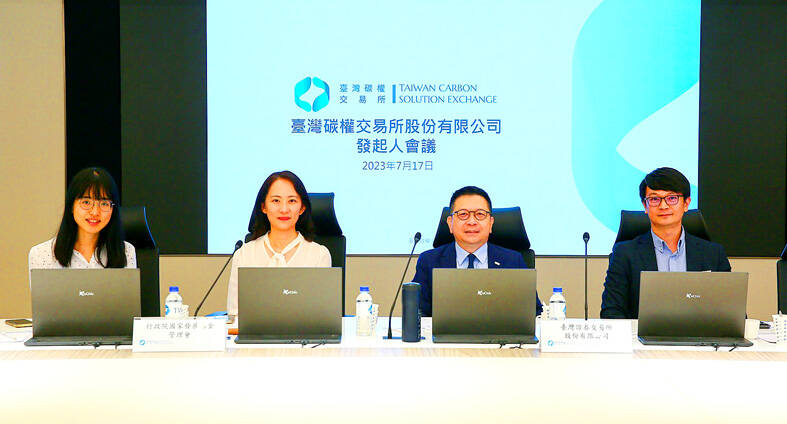Taiwan’s carbon exchange is to open today in Kaohsiung, as the nation aims to achieve net zero emissions by 2050, while addressing local firms’ need for carbon credit trading.
The Taiwan Stock Exchange and the National Development Fund jointly invested in the Taiwan Carbon Solution Exchange with NT$1.5 billion (US$47.33 million) of capital. It established its headquarters at the Kaohsiung Software Park (高雄軟體園區) and its information center in Taipei, after completing its company registration last month.
The Taiwan Stock Exchange has planned for the carbon exchange to include a carbon consultancy, and education and training, as well as to offer carbon credit trading.

Photo courtesy of the Taiwan Stock Exchange
To alleviate concerns among businesses, the exchange would initially focus mainly on consultation services for issues such as domestic carbon fees and levies, international carbon border taxes and supply chain carbon neutrality. It would also provide education and training services for businesses during this stage.
Carbon credit trading would come later, as such trading must meet regulations and policies stipulated by the Climate Change Response Act (氣候變遷因應法), and the Environmental Protection Administration (EPA) is still working out carbon pricing and trading rules.
Cross-border carbon trading would require further negotiations and collaboration with international accreditation institutions based on the needs of local businesses, the Taiwan Stock Exchange said.
Due to the net zero emission trend, companies seeking to secure orders are soon bound to include carbon emissions in their contract terms, as firms wanting to obtain orders from major global brands would have to comply with emission regulations.
The carbon exchange aims to help local businesses through carbon credit trading, the Taiwan Stock Exchange said.
For instance, if a company can reduce its carbon emissions, it would have excess carbon credits that can be sold to other companies with higher carbon emissions, while industries or companies with high carbon emissions can purchase carbon credits to offset their carbon footprints and achieve their carbon reduction goals, it said.
The Taipei-based Chinese National Association of Industry and Commerce yesterday welcomed the launch of the carbon exchange, saying in a statement that it is an important milestone along the nation’s road to achieving net zero emissions by 2050.
The association urged the government to establish the legal system for carbon credit trading as soon as possible, while implementing the trading mechanism in stages.
It said it also expects Taiwan’s carbon exchange to learn from its international peers to develop carbon pricing and trading systems that are sound and in line with international standards, so that domestic firms can plan carbon reduction paths in a timely manner and Taiwan’s industries can maintain their key position in the global supply chain.

CHAOS: Iranians took to the streets playing celebratory music after reports of Khamenei’s death on Saturday, while mourners also gathered in Tehran yesterday Iranian Supreme Leader Ayatollah Ali Khamenei was killed in a major attack on Iran launched by Israel and the US, throwing the future of the Islamic republic into doubt and raising the risk of regional instability. Iranian state television and the state-run IRNA news agency announced the 86-year-old’s death early yesterday. US President Donald Trump said it gave Iranians their “greatest chance” to “take back” their country. The announcements came after a joint US and Israeli aerial bombardment that targeted Iranian military and governmental sites. Trump said the “heavy and pinpoint bombing” would continue through the week or as long

TRUST: The KMT said it respected the US’ timing and considerations, and hoped it would continue to honor its commitments to helping Taiwan bolster its defenses and deterrence US President Donald Trump is delaying a multibillion-dollar arms sale to Taiwan to ensure his visit to Beijing is successful, a New York Times report said. The weapons sales package has stalled in the US Department of State, the report said, citing US officials it did not identify. The White House has told agencies not to push forward ahead of Trump’s meeting with Chinese President Xi Jinping (習近平), it said. The two last month held a phone call to discuss trade and geopolitical flashpoints ahead of the summit. Xi raised the Taiwan issue and urged the US to handle arms sales to

BIG SPENDERS: Foreign investors bought the most Taiwan equities since 2005, signaling confidence that an AI boom would continue to benefit chipmakers Taiwan Semiconductor Manufacturing Co’s (TSMC, 台積電) market capitalization swelled to US$2 trillion for the first time following a 4.25 percent rally in its American depositary receipts (ADR) overnight, putting the world’s biggest contract chipmaker sixth on the list of the world’s biggest companies by market capitalization, just behind Amazon.com Inc. The site CompaniesMarketcap.com ranked TSMC ahead of Saudi Aramco and Meta Platforms Inc. The Taiwanese company’s ADRs on Tuesday surged to US$385.75 on the New York Stock Exchange, as strong demand for artificial intelligence (AI) applications led to chip supply constraints and boost revenue growth to record-breaking levels. Each TSMC ADR represents

Pro-democracy media tycoon Jimmy Lai’s (黎智英) fraud conviction and prison sentence were yesterday overturned by a Hong Kong court, in a surprise legal decision that comes soon after Lai was jailed for 20 years on a separate national security charge. Judges Jeremy Poon (潘兆初), Anthea Pang (彭寶琴) and Derek Pang (彭偉昌) said in the judgement that they allowed the appeal from Lai, and another defendant in the case, to proceed, as a lower court judge had “erred.” “The Court of Appeal gave them leave to appeal against their conviction, allowed their appeals, quashed the convictions and set aside the sentences,” the judges